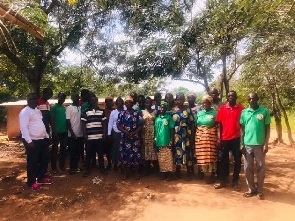Many farmers in Sappor, a farming community in the Asuogyaman District of the Eastern Region continue to lose a chunk of their produce to post-harvest losses.
Many of the losses occur as a result of poor farming practices before, during and after harvest, resulting in harsh financial losses to the producers.
To address this challenge, Rescue Volunteers Ghana, an NGO has held a day’s training seminar for the affected farmers on best practices to adopt to enable them to reap maximum yields.
The event held at Sappor, brought together plantain, maize and cassava farmers from the community.
Educating the farmers on the causes and preventions of post-harvest losses, the Agric Extension Officer for the Sappor-Yeneama Electoral Area, Mr. Ishmeal Gborgla attributed the canker to late harvesting, bad farming practices, lack of proper storage facilities in the farms and at home, improper application of chemicals, etc.
He explained that late harvesting results in pests infesting crops such as maize and thereby reducing yield and called on the farmers to erect cribs and barns at home and in the farms to ensure the proper storage systems for their harvest.
Mr. Gborgla said in an interview that producers had no choice but to adhere to best farming practices to ensure that they enjoy the fruits of their labour.
“We’ve realized that our farmers are not adhering to the post-harvest loss principles and it is affecting them so we decided to come to let them know that the right thing must be done for them to be in the system because it is a business they are doing and if they neglect what will give them money that means they should forget about whatever they are doing,” the extension officer noted.
He stressed that practising the principles against post-harvest losses was the only way to ensure the food security of the country and enrich farmers.
The canker, Mr. Gborgla noted robbed farmers of their deserved earnings and was hopeful that the workshop opened the minds of the farmers and they would henceforth resort to the best farming practices to address the canker.
He urged the farmers to put into practice the content of the training for their benefit and those of their consumers.
Explaining the rationale behind the workshop, Eastern Regional Coordinator of Agriculture under Rescue Volunteers Ghana. Mr. Abraham Opare Appiah expressed regret that farmers were losing their investments as a result of poor harvests before and after harvesting.
“We found out that the farmers have problems. They invest and at the time of harvesting they delay the crops on the field so that causes losses,” explained Mr. Appiah.
He said though the producers were already aware of the causes of the losses, they nevertheless failed to adhere to and adopt the best practices hence the need to hold the seminar to serve as a reminder to them.
The Regional Coordinator of Agriculture was however hopeful that farmers following the education would adopt the best practices learnt to enhance and improve their crop yield to ensure maximum profits.
Mr. Opare Appiah said, “It is something they knew already and stopped doing so they’ve accepted it and said they’d adjust to and go back to their practices.”
He urged the farmers to remain focused on their occupation to reap the benefits of their labour as the cost of inputs and farm implements had increased.
A Dadematse of the area who participated in the event said, “The mistake that we’ve been doing in our harvesting, we learnt today that all the time, we must make sheds so that we harvest the sheds inside earlier so that it doesn’t spoil.”
He admitted that most farmers harvested late amidst other factors and expressed the readiness of the farmers to adopt preventive measures to address the issues.
A 50-year-old woman who cultivates maize, cassava and plantain also described the issue of post-harvest losses as a major problem for them and blamed the development on the farmlands losing most of its nutrients as well as late harvesting occasioned by farmers involving themselves in the cultivation of other crops even when they should be harvesting.
“If you cultivate an acre of maize, for instance, you must harvest at least, 20 bags but because the land has lost its nutrients, we’re unable to get this so we need fertilizers. We are only able to get about 15 bags,” said the 50-year-old.
Some of the farmers also blamed the lack of labour to harvest at the appropriate time as another major cause of post-harvest losses among farmers in the area.
Regional News of Thursday, 8 December 2022
Source: Michael Oberteye
Seminar for farmers on post-harvest losses held at Sappor
Opinions












